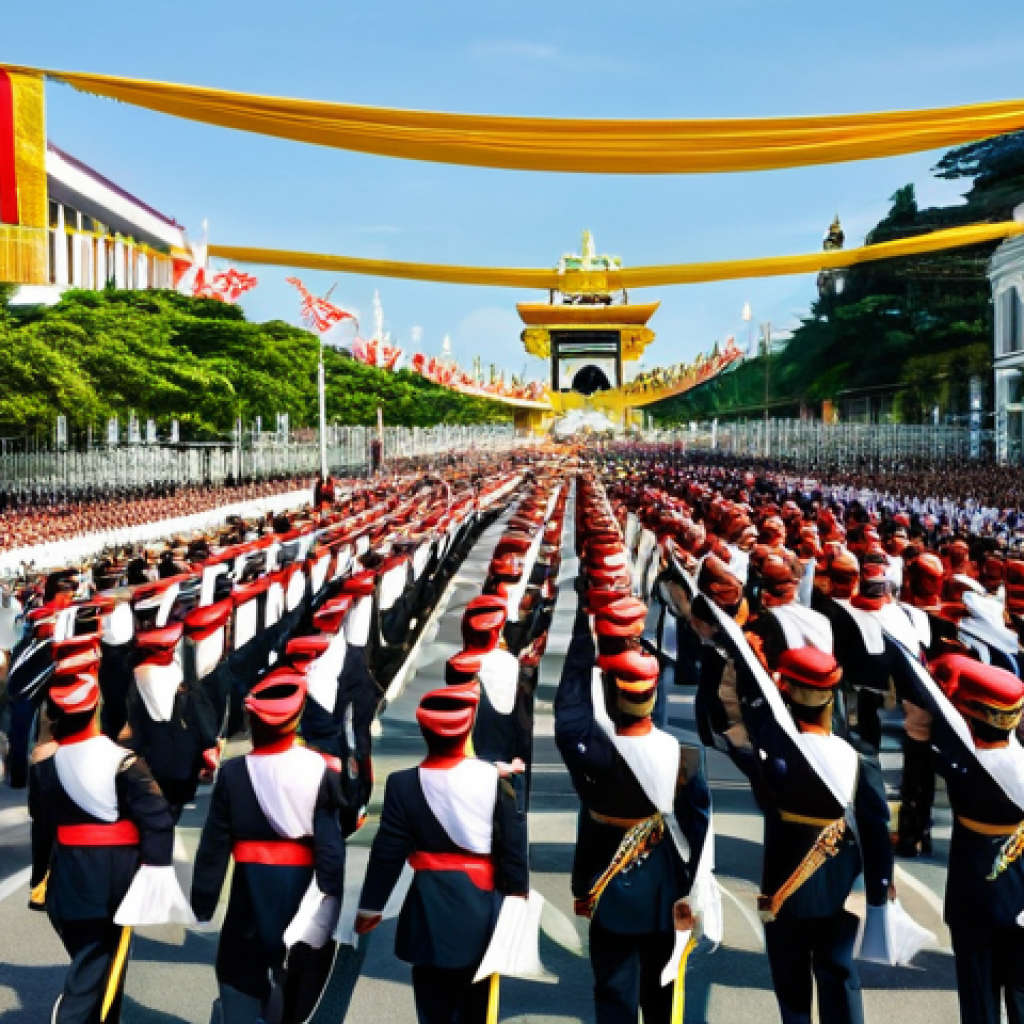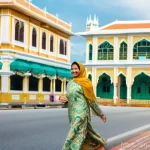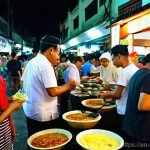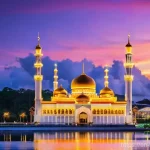Have you ever yearned to step into a vibrant tapestry woven from diverse cultures, rich traditions, and heartfelt celebrations? Brunei, often called the “Abode of Peace,” isn’t just a destination; it’s an experience that truly comes alive through its incredible multicultural festivals.
These aren’t just events on a calendar; they’re windows into the soul of a nation, showcasing a harmonious blend of Malay heritage, indigenous customs, and Islamic faith.
From the grandeur of royal festivities to the intimate joy of community gatherings, Brunei invites you to immerse yourself in its unique cultural rhythm.
Trust me, experiencing these firsthand offers a connection you won’t find anywhere else. Let’s peel back the layers and discover the magic together. When I think about what truly sets a travel destination apart, it’s often the genuine cultural encounters – those moments that spark joy and broaden your perspective.
In Brunei, this feeling is amplified by its incredible array of multicultural festivals. What I’ve personally observed is how seamlessly different communities, from the indigenous Iban and Dusun celebrating their Harvest Festivals (Adau Gayoh or Gawai) to the vibrant lion dances of Chinese New Year, contribute to a breathtaking mosaic of traditions.
Each celebration, whether it’s the solemn reverence of Nuzul Al-Quran or the spectacular nationwide jubilation of the Sultan’s Birthday, isn’t just a spectacle for tourists; it’s a living, breathing testament to the country’s unity and its deep-rooted pride.
In an era where travelers are increasingly seeking authentic, immersive experiences over fleeting trends, Brunei stands out. Its commitment to preserving and sharing these unique cultural treasures, often through initiatives like the Brunei December Festival, truly speaks to the global shift towards more meaningful and sustainable tourism.
Getting involved, even just as an observer, allows you to feel the pulse of a truly diverse and welcoming society. These aren’t just old customs; they’re dynamic expressions constantly evolving, offering fresh insights into a fascinating corner of Southeast Asia.
The Royal Grandeur of National Day and the Sultan’s Birthday
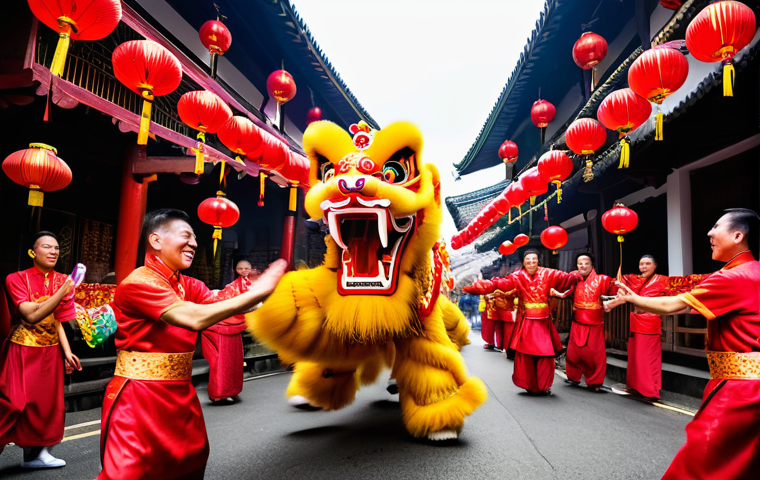
When you think of Brunei, you might immediately picture its majestic mosques or the serene Water Village, but let me tell you, nothing quite prepares you for the sheer scale and heartfelt patriotism displayed during the Sultan’s Birthday celebration or National Day.
I distinctly remember the electric atmosphere permeating the capital, Bandar Seri Begawan, on His Majesty’s birthday. It wasn’t just a public holiday; it felt like the entire nation was humming with anticipation and joy.
The streets, usually calm and orderly, erupted in a symphony of colours and sounds, with banners fluttering proudly and intricate decorations adorning every corner.
You could literally feel the collective pride in the air, a deep-seated respect and affection for their monarch that’s truly palpable. This isn’t just a formality; it’s a profound cultural expression of unity and identity that truly binds the Bruneian people.
Seeing families dressed in their finest, gathering along parade routes, sharing food, and beaming with smiles, makes you realize this is more than just a ceremony – it’s a cherished communal experience.
It’s a moment when everyone, regardless of their background, comes together to celebrate their shared heritage and future.
Witnessing the Pageantry
The parades themselves are absolutely breathtaking, a spectacle of precision and vibrant tradition. Imagine thousands of participants, from disciplined military personnel to school children and community groups, marching in perfect synchronicity, each in their beautifully tailored traditional attire.
The sheer scale and coordination are astounding. I found myself completely swept up in the moment, cheering along with the locals, feeling a genuine connection to the palpable sense of national pride.
The rhythmic drumming, the traditional dances, and the dazzling floats – it’s a feast for the senses. It’s one of those experiences where you put your camera down for a few moments, letting the sights and sounds simply wash over you, soaking in every single detail.
You realize this isn’t just entertainment; it’s a living history lesson, showcasing the resilience and spirit of the Bruneian people.
A Nation United in Celebration
What really struck me during these grand celebrations was the unifying effect they had on everyone present. It didn’t matter if you were a local or a visitor like myself; the energy was infectious.
People exchanged smiles and greetings freely, and there was an undeniable sense of camaraderie. The entire city transforms into a grand stage, and every citizen plays a part, whether actively participating in the parade or simply lining the streets to cheer.
These events are deeply ingrained in the national psyche, serving as a powerful reminder of Brunei’s rich history and its promising future. It’s an immersive experience that leaves you feeling more connected to the country and its people, offering a glimpse into the heart of Bruneian identity that official tours simply cannot replicate.
You feel privileged to witness such a genuine outpouring of national spirit.
Hari Raya Aidilfitri: A Time for Forgiveness and Feasting
Moving from grand national displays to something more intimately heartfelt, Hari Raya Aidilfitri, marking the end of Ramadan, is an experience I truly cherish from my time in Brunei.
It’s a period that embodies warmth, generosity, and an incredible sense of community. After a month of fasting and reflection, the joy that permeates the air is almost tangible, a collective sigh of relief and celebration.
What makes Hari Raya particularly special in Brunei, in my humble opinion, is the tradition of ‘open houses.’ This isn’t just a phrase; it’s a deeply ingrained cultural practice where families literally open their homes to friends, relatives, and even strangers, offering an abundance of delicious food, drinks, and warm hospitality.
I remember being invited to several such homes, and each time, I was struck by the genuine welcome and the sheer effort hosts put into making everyone feel comfortable and loved.
It felt like being part of an enormous, extended family, breaking bread and sharing stories in a truly inclusive atmosphere. This custom beautifully illustrates the Bruneian spirit of kindness and communal harmony, a value I deeply admire.
Open Houses and Warm Welcomes
The concept of the open house during Hari Raya is simply delightful. Imagine beautifully decorated homes, tables laden with an array of traditional Malay delicacies – think *rendang*, *ketupat*, *laksa*, and an assortment of colourful kuih (traditional cakes and pastries) – all prepared with incredible care and love.
As a guest, you’re not just offered food; you’re offered a piece of their culture, a share in their joy. I recall one particular open house where the host, a sweet elderly lady, insisted I try every single dish, explaining the ingredients and the stories behind them with such enthusiasm.
It wasn’t just a meal; it was a storytelling session, a culinary journey that connected me directly to the heart of Bruneian home life. The generosity is overwhelming, and it’s truly a privilege to be part of such an intimate and joyful occasion.
It really makes you feel like you’re not just visiting, but truly experiencing the culture.
The Joy of Forgiveness and Family Bonds
Beyond the incredible food and fellowship, Hari Raya is also a profound time for forgiveness and strengthening family bonds. It’s common practice for younger family members to seek forgiveness from elders, and this beautiful ritual truly underscores the respect and harmony central to Bruneian society.
You see families dressed in matching traditional outfits, children excitedly receiving ‘duit raya’ (money packets), and a general atmosphere of peace and reconciliation.
Observing this, I felt a deep appreciation for the values that underpin these celebrations. It’s not just about feasting; it’s about reconnecting, renewing relationships, and ensuring that love and understanding continue to flourish within the community.
This emotional depth is what elevates Hari Raya from a mere public holiday to a truly sacred and cherished annual event, making it an unforgettable part of the Bruneian cultural calendar.
Echoes of Ancestors: Indigenous Harvest Festivals
While the grandeur of royal events and the warmth of Islamic festivals are prominent, Brunei’s cultural tapestry wouldn’t be complete without acknowledging the vibrant indigenous celebrations, particularly the Harvest Festivals.
These aren’t widely publicized in the same way as national holidays, which makes discovering them feel like unearthing a hidden gem. The Adau Gayoh celebrated by the Dusun community and Gawai, a similar festival observed by the Iban, are deeply rooted in ancient customs and a profound reverence for nature’s bounty.
When I had the chance to witness some of the preparations for Adau Gayoh, I was fascinated by the intricate rituals and the deep spiritual connection the community shares with the land.
These festivals are essentially a thanksgiving for a successful harvest, a time to honor the spirits and ensure future prosperity. It’s a beautiful, raw expression of gratitude that often gets lost in our fast-paced modern world, and it truly grounds you when you experience it firsthand.
You gain an immense appreciation for sustainable living and the wisdom passed down through generations.
Adau Gayoh and Gawai: Celebrating Nature’s Bounty
These harvest festivals are a dazzling display of traditional attire, music, dance, and communal feasting. For the Dusun, Adau Gayoh often involves traditional sports, ancestral rites, and a joyous gathering where food, particularly traditional rice wine (*tapai*), flows freely.
The Iban Gawai, similarly, is a time of open houses, traditional performances like the *ngajat* dance, and symbolic rituals to bless the harvest. I remember seeing photographs of the intricate beadwork and woven textiles worn during these times, each pattern telling a story passed down through countless years.
It’s not just about merriment; it’s a vital act of cultural preservation. The elders play a crucial role, passing on ancestral knowledge and ensuring that these sacred practices continue to thrive, providing a continuity that is truly inspiring to witness.
Cultural Preservation Through Dance and Song
The heart of these indigenous celebrations often lies in their traditional music and dance. The rhythmic beating of gongs and drums, coupled with graceful, often elaborate dance movements, narrates stories of their ancestors, their relationship with the environment, and their communal history.
These aren’t merely performances; they are living manifestations of cultural identity. I was particularly moved by the emotional depth conveyed through these traditional arts.
It’s a powerful testament to how communities maintain their unique heritage in a rapidly changing world. These festivals are not just about looking back; they’re about actively living and breathing their traditions, ensuring that the younger generations understand and appreciate the richness of their ancestral roots.
It made me reflect on the importance of preserving diverse cultures globally, recognizing that each one contributes to the vast tapestry of human experience.
Chinese New Year: A Symphony of Red and Gold
Stepping into another vibrant facet of Brunei’s multiculturalism, Chinese New Year is an absolute explosion of joy, colour, and captivating traditions.
While Brunei is predominantly Malay Muslim, the Chinese community here plays an integral role in the nation’s fabric, and their New Year celebrations are nothing short of spectacular.
I’ve always found the transition from the relatively quiet days leading up to it, to the sudden burst of firecrackers, lion dances, and the vibrant red decor absolutely exhilarating.
It’s a time when the air crackles with anticipation, and every corner of the Chinese commercial areas, and even residential neighbourhoods, transforms into a festive wonderland.
The vibrant energy is truly infectious, and it’s a wonderful example of how different communities contribute to the overall rich cultural landscape of the country.
You can’t help but get caught up in the excitement, even if you’re just observing from the sidelines.
Lion Dances and Family Reunions
One of the most iconic sights during Chinese New Year has to be the mesmerizing lion dances. I vividly recall the booming drums and clashing cymbals announcing the arrival of these majestic, colourful creatures, bringing good luck and chasing away evil spirits.
Watching the performers execute their acrobatic feats with such precision and energy is truly a treat. Beyond the public displays, Chinese New Year is fundamentally about family reunion.
Families gather for sumptuous reunion dinners, exchange ‘ang pow’ (red packets containing money, symbolizing good fortune), and visit relatives. I had the privilege of witnessing some of these private gatherings through local friends, and the warmth and hospitality were immense.
It’s a beautiful reminder of the universal importance of family bonds, transcending cultural differences.
The Fusion of Traditions
What I find particularly fascinating about Chinese New Year in Brunei is the subtle yet significant fusion of traditions. While the core customs remain distinctly Chinese, they exist harmoniously within the broader Bruneian context.
Many local Malay families also partake in the festivities, often visiting Chinese friends and neighbours, symbolizing the strong inter-ethnic ties that define Brunei’s social fabric.
This cultural exchange is a testament to the nation’s ‘Abode of Peace’ moniker. Below is a quick overview of some of the key multicultural festivals in Brunei that truly showcase this incredible harmony:
| Festival Name | Primary Community | Approximate Time of Year | Key Elements & Significance |
|---|---|---|---|
| Sultan’s Birthday | All Bruneians | July | National celebrations, parades, royal ceremonies; celebrates His Majesty’s birthday and national unity. |
| Hari Raya Aidilfitri | Malay Muslim | Depends on Islamic calendar (after Ramadan) | Open houses, family gatherings, forgiveness, feasting; marks the end of the fasting month. |
| Adau Gayoh / Gawai | Dusun / Iban (Indigenous) | May / June | Harvest thanksgiving, traditional rituals, dances, music; celebrates successful harvests and ancestral blessings. |
| Chinese New Year | Chinese | January / February (Lunar Calendar) | Lion dances, family reunions, red packet exchanges; ushers in good fortune and family togetherness. |
| Nuzul Al-Quran | Malay Muslim | Depends on Islamic calendar (Ramadan) | Religious recitations, special prayers, study of the Quran; commemorates the revelation of the Quran. |
This intermingling of celebrations is a beautiful thing to witness, truly illustrating how diverse cultures can thrive side-by-side, enriching the entire nation.
Islamic Holy Days: Nuzul Al-Quran and Maulidur Rasul
Beyond the vibrant colours and joyous gatherings, Brunei’s cultural landscape is profoundly shaped by its deep-seated Islamic faith, which manifests beautifully in significant religious observances like Nuzul Al-Quran and Maulidur Rasul.
These aren’t just solemn occasions; they are powerful reminders of spiritual devotion and community unity. I’ve found that understanding these holy days offers a deeper insight into the Bruneian way of life, where faith is not just a personal belief but a cornerstone of society.
The atmosphere during these times is distinctively serene, imbued with a sense of reverence and reflection. It’s a stark yet beautiful contrast to the more boisterous celebrations, offering a moment for collective introspection and spiritual growth that I, as an observer, found incredibly moving and educational.
You really feel the spiritual pulse of the nation during these periods.
Reflections on Faith and Revelation
Nuzul Al-Quran commemorates the first revelation of the Holy Quran to Prophet Muhammad (PBUH). During this sacred time, mosques across Brunei become focal points for special prayers, religious lectures, and Quranic recitations.
I remember hearing the melodic recitations drifting from mosques, creating an incredibly peaceful and spiritual ambiance throughout the city. It’s a time for Muslims to deepen their understanding of their faith, to reflect on the teachings of the Quran, and to engage in acts of devotion.
For anyone seeking to understand the spiritual heart of Brunei, witnessing the profound respect and dedication during Nuzul Al-Quran is truly insightful.
It’s a period of collective spiritual renewal that resonates deeply within the community, reinforcing their shared values and beliefs.
Community and Devotion
Similarly, Maulidur Rasul, the birthday of Prophet Muhammad (PBUH), is observed with great respect and community gatherings. Parades and processions, often featuring large numbers of people reciting salawat (praises for the Prophet), are common.
While not as flashy as some other festivals, the sheer number of participants and the fervent devotion are incredibly powerful. It underscores the importance of the Prophet’s teachings in daily life and reinforces the bonds of the Muslim community.
Experiencing these holy days, even as an outsider, provides a profound sense of the role of faith in Bruneian society – a role that encourages unity, humility, and a strong sense of collective identity.
It’s a gentle yet firm reminder that in Brunei, spiritual life is woven intricately into the very fabric of existence.
Brunei December Festival: A Modern Showcase of Culture
As much as Brunei cherishes its ancient traditions, it’s also forward-looking, and the Brunei December Festival is a shining example of this progressive spirit.
This month-long extravaganza, typically held throughout December, isn’t just one event; it’s a curated collection of diverse activities, designed to attract both locals and tourists, and to celebrate the multifaceted aspects of Bruneian life.
I absolutely love how this festival encapsulates a bit of everything – from cultural performances and art exhibitions to food bazaars and sporting events.
It feels like a grand finale to the year, a vibrant burst of energy that showcases the nation’s capacity to blend tradition with contemporary appeal. It really demonstrates Brunei’s commitment to creating dynamic cultural experiences and drawing visitors to explore its depth beyond the usual tourist spots, making it an ideal time to visit if you’re looking for a packed itinerary of fun and discovery.
A Month of Diverse Events
The beauty of the Brunei December Festival lies in its incredible variety. One year, I stumbled upon a traditional handicraft fair where local artisans were demonstrating their skills, from intricate weaving to delicate silversmithing.
Another time, I found myself mesmerized by contemporary Bruneian musical performances that fused traditional instruments with modern sounds. There are usually food festivals showcasing the country’s delectable cuisine, adventure sports events for the thrill-seekers, and even eco-tourism initiatives that highlight Brunei’s stunning natural beauty.
It’s truly a smorgasbord of experiences, ensuring that there’s something for everyone, regardless of your interests. This diversity not only entertains but also educates, offering deeper insights into the country’s various talents and offerings.
Bridging Tradition and Contemporary Arts
What truly impressed me about the Brunei December Festival is its masterful ability to bridge the gap between long-held traditions and contemporary artistic expressions.
It serves as a platform for younger generations to reinterpret their heritage in modern ways, breathing new life into ancient customs. You might find traditional *gulingtangan* music presented with a modern twist, or classical Malay storytelling enhanced with digital projections.
This blending ensures that culture remains relevant and engaging for a modern audience while preserving its essence. It’s a testament to Brunei’s dynamic cultural scene, proving that tradition doesn’t have to be static.
Instead, it can evolve, adapt, and continue to captivate, making Brunei a fascinating destination for those who appreciate both its historical roots and its evolving cultural landscape.
Wrapping Up My Brunei Journey
And there you have it, a whirlwind tour through the heart of Brunei’s captivating festivals! From the majestic display of national pride during the Sultan’s Birthday to the intimate warmth of Hari Raya open houses, the ancient echoes of indigenous harvest celebrations, the vibrant energy of Chinese New Year, and the spiritual depth of Islamic holy days, this tiny nation truly offers a kaleidoscope of cultural experiences. Each festival, in its unique way, paints a vivid picture of a country that cherishes its heritage, embraces diversity, and thrives on a profound sense of community. It’s been an absolute privilege to share these moments and insights with you, and I truly hope it inspires you to discover the magic for yourself.
Insider Tips for Your Brunei Adventure
1. Timing is Everything: Planning Your Festival Visit. If you’re looking to truly immerse yourself in Brunei’s vibrant culture, aligning your visit with one of its major festivals is an absolute game-changer. I personally found that checking the lunar calendar for Hari Raya Aidilfitri or Chinese New Year well in advance allowed me to experience the country at its most lively and authentic. Keep in mind that dates for Islamic holidays shift annually, so a quick online search for “Brunei public holidays [year]” is your best friend. For national events like the Sultan’s Birthday (July), the dates are fixed, making planning a bit easier. Just remember that during these peak times, flights and accommodations can book up quickly, and prices might see a slight bump, so early booking is highly recommended to snag the best deals! You’ll thank me later for this little bit of foresight.
2. Dress Respectfully and Embrace Local Customs. Brunei is a predominantly Muslim nation, and showing respect for local customs and religious practices goes a long way. When visiting mosques or attending religious ceremonies, modest attire is a must – think long sleeves and trousers/skirts, and women should consider bringing a headscarf. During Hari Raya, when visiting open houses, it’s customary to remove your shoes before entering and to greet elders respectfully. While Bruneians are incredibly welcoming, making an effort to understand and adhere to these simple courtesies will not only enhance your own experience but also show genuine appreciation for their culture. I always keep a light scarf in my bag, just in case, and it’s served me well in various situations!
3. Navigating Around: Transport & Connectivity. Getting around Brunei is surprisingly easy, though public transport options are somewhat limited outside of Bandar Seri Begawan. Taxis are readily available, and ride-hailing apps like Dart are incredibly convenient and affordable, especially if you’re exploring the capital. For venturing further afield, renting a car offers the most flexibility, giving you the freedom to discover hidden gems at your own pace. I actually found that having a local SIM card (easily purchased at the airport) was a lifesaver for navigation and staying connected with tour operators. The coverage is generally excellent, and it makes planning on the go a breeze. Don’t forget to download offline maps, just in case you find yourself in a more remote area – better safe than sorry!
4. Savouring the Flavors: A Culinary Journey Awaits. Oh, the food! Brunei’s culinary scene is a delightful blend of Malay, Chinese, and indigenous influences, and you simply cannot leave without indulging in its local delicacies. From the national dish, Ambuyat (a sago starch eaten with a bamboo fork and various dips), to the rich curries, freshly grilled seafood, and an array of sweet kuih, your taste buds are in for a treat. Don’t be shy to explore local markets and hawker centers for the most authentic and budget-friendly eats. I still dream about the Nasi Katok I had from a roadside stall – simple, yet utterly delicious! Always carry some small denominations of Brunei Dollars (BND) for these local treasures, as not all vendors accept cards. It’s a part of the adventure, trust me.
5. Beyond the Festivals: Exploring Brunei’s Natural Wonders. While the festivals are undoubtedly a highlight, don’t overlook Brunei’s incredible natural beauty. The country boasts vast tracts of pristine rainforest, particularly in Ulu Temburong National Park, offering incredible ecotourism opportunities. Imagine canopy walks high above the jungle floor, river cruises, and spotting diverse wildlife – it’s a nature lover’s paradise. I highly recommend booking a guided tour for Ulu Temburong as access is restricted, and it ensures you get the most out of the experience. It’s a fantastic contrast to the urban bustle of the festivals and offers a profound sense of tranquility. Combining cultural immersion with nature’s embrace truly provides a holistic and unforgettable Bruneian experience, one that will stay with you long after you’ve returned home.
My Essential Brunei Festival Guide: What I’ve Learned
Reflecting on my experiences with Brunei’s diverse festivals, what truly stands out is the profound sense of unity and deep cultural pride that permeates every celebration. Whether it’s the grand spectacle of the Sultan’s Birthday, bringing together an entire nation in patriotic joy, or the intimate, heartwarming open houses during Hari Raya that foster a spirit of generosity and forgiveness, these events are much more than mere holidays. They are living, breathing expressions of Brunei’s identity, woven into the fabric of its people’s daily lives. I’ve come to appreciate how seamlessly different communities – Malay, Chinese, and indigenous – coexist and celebrate, often participating in each other’s festivities, creating a uniquely harmonious society. It’s a powerful lesson in multiculturalism, demonstrating how shared joy and respect can truly bind a nation. Planning your visit around these celebrations is, without a doubt, the best way to gain an authentic understanding of this ‘Abode of Peace’ and its wonderfully welcoming people.
Frequently Asked Questions (FAQ) 📖
Q: I’m planning my trip to Brunei and want to experience the absolute best of its cultural festivals! Which ones are the “must-sees,” and when’s the ideal time to visit to catch them?
A: Oh, you’re in for a treat! This is such a fantastic question because timing truly makes all the difference when you want to dive deep into Brunei’s vibrant cultural scene.
From my own adventures, if you’re looking for a truly immersive experience, you absolutely cannot miss the celebrations surrounding Hari Raya Aidilfitri (Eid al-Fitr).
This marks the end of Ramadan, and trust me, the entire nation comes alive with open houses where you can literally visit the Sultan’s palace, as well as homes of ministers and locals.
It’s an incredible display of warmth and hospitality, usually falling around April to May, but it shifts annually with the Islamic calendar, so always check the exact dates!
Then there’s the Sultan’s Birthday Celebration in July – it’s a spectacle of national pride with parades, illuminations, and a truly palpable sense of unity.
If you’re keen on indigenous cultures, the Harvest Festivals like Adau Gayoh (Dusun) or Gawai (Iban) are wonderful, typically around May to June, though they’re often celebrated in specific longhouse communities.
And of course, for a splash of dazzling color and energetic performances, Chinese New Year (usually January or February) brings incredible lion and dragon dances to the mix, especially around the Chinese temples and community halls.
What I’ve personally found to be a game-changer for planning is looking into the Brunei December Festival. This month-long extravaganza often bundles many cultural events, performances, and food festivals, making it an excellent time to visit if you want a concentrated dose of Bruneian culture, all in one go!
So, while Hari Raya and the Sultan’s Birthday are major highlights, the December Festival offers a fantastic blend if your travel window is flexible. Always double-check the specific lunar calendar dates for the Islamic and Chinese festivals, but trust me, whichever you choose, you’ll leave with memories that sparkle!
Q: I want to make sure I’m being a respectful and responsible traveler while enjoying these festivals. What’s the best way for visitors to genuinely engage with the local culture without being intrusive?
A: This is such a thoughtful question, and it’s exactly the mindset that makes for the most enriching travel experiences! From what I’ve observed, Bruneians are incredibly welcoming, and showing a genuine interest in their traditions is always appreciated.
My top tip, based on my own interactions, is to dress modestly. Especially during religious festivals or when visiting mosques or traditional homes, ensuring your shoulders and knees are covered, and for women, perhaps having a scarf handy to cover your head if entering a mosque, goes a long way.
It’s a simple gesture that shows immense respect. When attending open houses during Hari Raya, a small gift (like a box of chocolates or local delicacies) is a lovely touch, though by no means expected.
Remember to always accept food or drink offered to you – even a small bite or sip – as refusing can sometimes be seen as impolite. And here’s a golden nugget from my own experiences: always use your right hand when shaking hands, giving, or receiving anything, as the left hand is considered unclean in Islamic culture.
Most importantly, engage with a smile and an open heart! Ask questions (respectfully, of course!) if you’re curious about a tradition. Locals are often delighted to share their culture.
I remember once asking about a specific dish during a festival, and the host happily explained its history and significance. These small interactions are where the magic truly happens.
Participate in the cheer, clap along with performances, and simply be present. It’s about being an observer, yes, but also a gentle participant in the shared joy.
Q: With so many festivals, how can I find out about the more localized or community-specific events that might not be widely publicized, and are there any unique activities I should look out for?
A: This is where the true adventure begins – digging a little deeper to unearth those hidden gems! While the major national festivals are well-documented, finding those charming, community-specific events requires a bit more savvy, but it’s totally worth the effort.
What I’ve personally found most effective is checking local tourism websites, especially those managed by the Brunei Tourism Board or even local district offices, closer to your travel dates.
They often update their “Events” sections with more localized happenings, especially those linked to the Brunei December Festival or specific cultural initiatives.
Don’t underestimate the power of local connections! Once you arrive, chat with your hotel concierge, guesthouse hosts, or even friendly taxi drivers. They are often treasure troves of information about what’s happening “on the ground” in their specific areas or villages.
I’ve stumbled upon a fantastic local handicraft fair and an impromptu traditional music performance just by asking around. As for unique activities, keep an eye out for traditional games demonstrations during cultural events – things like sepak takraw (a foot volleyball game) or top-spinning competitions are mesmerizing to watch.
During indigenous harvest festivals, you might even get a chance to see traditional dances like the Iban ngajat or Dusun adan dances, which are truly captivating and tell incredible stories through movement.
If you’re lucky, you might even find workshops on traditional weaving or cooking. These are the moments that genuinely connect you to the heart of Brunei, offering an experience far beyond the typical tourist trail.
It’s about being open to discovery and letting curiosity lead the way!
📚 References
Wikipedia Encyclopedia
구글 검색 결과
구글 검색 결과
구글 검색 결과
구글 검색 결과
구글 검색 결과
